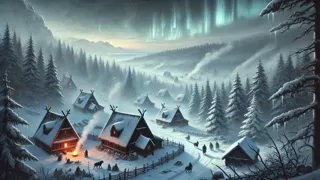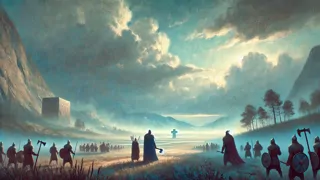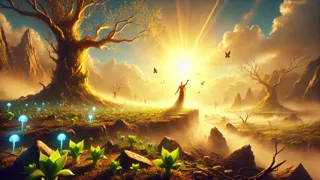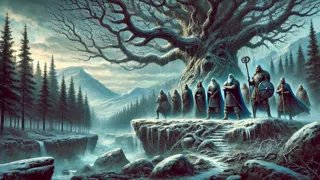Introduction
Beneath the endless, brooding sky of ancient Norway, where icy fjords pierce mountains and pine forests hold a silence both peaceful and grim, the legends of the gods were whispered for centuries. The world as the Norse knew it was never fixed; it teetered on the knife’s edge of chaos and order, ever threatened by forces older than memory. At the heart of these tales sits Ragnarök: the Twilight of the Gods, a prophecy carved deep into the bones of the cosmos, a tale of inevitable destruction and defiant hope. In the shadow of Yggdrasil, the World Tree whose roots bind the Nine Realms, gods and monsters alike prepared for an ending none could escape. For generations, seers recited the omens—Fimbulwinter, the endless snows that would freeze Midgard’s rivers; Sköll and Hati, the wolves poised to devour the sun and moon; and, most terrible, the breaking of bonds as Loki, the trickster, slipped his chains to lead the forces of chaos. The Aesir gods, led by wise and weary Odin, sensed the weight of destiny heavy upon their shoulders. Thor, the thunderer, felt Mjölnir’s grip colder with each passing day, while Freyja gathered the valiant in Folkvangr and Heimdall kept his golden horn close, ever vigilant on Bifröst, the rainbow bridge. The children of Loki—Jörmungandr, the Midgard serpent, and Fenrir, the monstrous wolf—grew restless in their fetters. The giants of Jotunheim sharpened their axes, waiting for the world to stumble. Beneath the ordinary lives of men and women in the snow-draped villages, a sense of dread and awe persisted. Ragnarök was more than an end; it was a reckoning. Yet, in the darkness of prophecy, glimmers of renewal shimmered. For every doom spoken, a promise of rebirth lingered, like frost melting beneath the spring sun. This is the story of Ragnarök: a world’s end, and a world reborn.
The Prophecies Unfold: Fimbulwinter and the Gathering Storm
The omens arrived not as distant whispers, but as howling truths that battered every corner of the Nine Realms. Fimbulwinter, that legendary season of unending cold, did not descend gently. It swept across Midgard in a wrathful cascade. Snow fell for three years without pause, blanketing farmsteads and forests, choking the fjords. The sea froze along its edges, trapping fishing boats in silent ice. Villagers huddled in their halls, telling stories by firelight as wolves prowled ever closer to their doors. Even in Asgard, the halls of the gods grew chill. Odin, the All-Father, watched from Hlidskjalf, his high seat, as the world below withered beneath white drifts. His ravens, Huginn and Muninn, circled tirelessly, bringing grim tidings from every realm. The sun and moon, pursued by the monstrous wolves Sköll and Hati, grew dimmer with each passing day. Finally, with a shudder that rippled through all existence, the celestial chase ended: the wolves caught their prey. Daylight faltered, leaving Midgard bathed in a perpetual twilight streaked with ghostly auroras. Crops failed. Hunger gnawed at mortals and immortals alike. Yet it was not hunger that brought the gods to council, but the sense that ancient bonds were breaking. In the iron depths of Helheim, Hel, the half-living daughter of Loki, stirred. Her pale eyes glimmered with a secret knowledge as she marshaled legions of the dead. From the salt-dark ocean, Jörmungandr shifted restlessly, the Midgard serpent’s coiling body sending tsunamis that shattered coasts. Most dreadful of all was Fenrir, the monstrous wolf. Bound for ages by the gods' cunning and the unbreakable ribbon Gleipnir, he howled at the night sky. Each note was a promise: I will be free. In Asgard’s great hall, Gylfaginning, Odin summoned his kin. Thor’s red beard bristled with impatience. Freyja’s green eyes glistened with sorrow and resolve. Baldur, radiant and doomed, stood silently at his father’s side. Loki’s absence—imprisoned for his crimes—hung over them like a thundercloud. “The end has begun,” Odin said, his voice heavy as mountain stone. “But we will not face it meekly.” They readied for war. The Valkyries soared across stormy skies, gathering fallen warriors to Valhalla and Folkvangr. Heimdall polished Gjallarhorn, the golden horn whose blast would signal the final battle. Frigg wept for her sons, knowing that even her wisdom could not turn fate aside. Meanwhile, deep within the earth, the dwarves forged weapons for the coming doom: gleaming axes and shields stronger than any before. In Jotunheim, the land of giants, armies formed under banners of ice and stone. Surtr, the fire giant from Muspelheim, prepared his flaming sword. The air itself seemed to crackle with tension as all living things felt destiny drawing taut. The world stood poised on the edge. Every prophecy recited in shadowy halls and wind-scoured crags felt suddenly immediate, alive. Fimbulwinter’s grip tightened, but beneath the snow and sorrow, courage burned brighter than ever.

The Shattering: Loki’s Betrayal and the Battle of Vigrid
Thunder split the sky as Loki’s chains broke. His laughter echoed across the Nine Realms—a sound of triumph and regret, for he too was bound by prophecy. Freed from his prison by a quake that rattled Yggdrasil’s deepest roots, Loki gathered his monstrous children. Fenrir’s eyes gleamed like embers in the dark. Jörmungandr uncoiled from the sea, clouds of salt spray hissing as he rose. The undead legions of Hel poured forth from their shadowy realm, led by their queen in a cloak of midnight and bone. The forces of chaos amassed at the plain of Vigrid: giants from Jotunheim, fire demons from Muspelheim, wolf, serpent, and dead alike. Surtr stood at their head, his flaming sword scorching the very air. Odin led the gods and their chosen warriors to meet this storm. Thor strode beside his father, Mjölnir crackling with stormfire. Frey and Freyja shone among the Einherjar, those fallen heroes chosen for this last battle. Heimdall took up his post on Bifröst. When he sounded Gjallarhorn, its blast rolled like thunder across every world—there would be no turning back. The plain of Vigrid stretched endlessly, scorched and blackened from ancient wars. As the armies collided, the earth shook with the force of their fury. Odin charged Fenrir, his spear Gungnir gleaming with runic power. The wolf snapped and roared, jaws wide as the sky. Thor hunted Jörmungandr through a maelstrom of storm and poison; thunder boomed as they clashed, waves lashing at their feet. Frey met Surtr in single combat, blade against blade, sun against fire. All around them, gods and monsters fell. The sky burned as Surtr’s flames raged. Loki and Heimdall found each other on the blood-soaked field—two fated enemies, mirror images of watchfulness and cunning. Their duel was fierce and brief; both struck mortal blows. They collapsed together, prophecy fulfilled. Odin fell to Fenrir’s jaws, swallowed by the beast he’d long feared. Yet vengeance was swift: Vidar, Odin’s silent son, leaped forth and with a boot of unbreakable leather, forced open Fenrir’s mouth and drove his sword through the wolf’s heart. Thor’s battle with Jörmungandr shook the heavens. At last he slew the serpent with a mighty blow of Mjölnir—but its venom splattered him, and he staggered nine steps before falling dead. Frey, weaponless against Surtr’s fire, was struck down, his sacrifice a symbol of hope in hopelessness. All across Vigrid, the world’s tapestry unraveled. The Bifröst cracked and fell. Yggdrasil shuddered as flames and poison bit at its roots. For every hero’s triumph, a thousand sorrows bloomed. But in those final moments—when all seemed lost—the seeds of renewal were sown. Baldr, radiant and beloved, began to stir in Helheim’s depths. Amid the wreckage of gods and monsters, whispers of dawn pierced the long night.

Renewal from Ruin: The New Dawn after Ragnarök
The world was broken. Vigrid lay silent beneath drifting ash and embers. The air was thick with smoke and the scent of scorched earth. The rainbow bridge had collapsed into the void; Yggdrasil’s roots smoldered but endured. For a moment, it seemed all life had been swept away by fire, ice, and sorrow. Yet life is stubborn. Through the cracks in ruined ground, new shoots pushed upward—tender green leaves defying the wasteland. Out of the darkness, a few survivors emerged. Lif and Lifthrasir, two mortals who had hidden deep within the sheltering branches of Yggdrasil, blinked in the newborn light. They would be the ancestors of a renewed race, untouched by the griefs of the past. From Helheim, Baldr returned, his radiance undimmed by death. He was joined by Hodr, his brother who had struck him down in an age-old tragedy. Forgiven and united, they became the new bearers of light and justice. The sons of Thor—Magni and Modi—rose from the battlefield, battered but alive. They lifted Mjölnir together, inheriting the mantle of thunder and protection. Vidar and Vali, sons of Odin, also survived, silent witnesses to both destruction and renewal. The sun reappeared, bright and golden. It was not the old sun, but her daughter—reborn to warm the world once more. Animals returned to streams and forests. The dead rivers began to flow, carrying away ashes and sorrow. The gods who had fallen did not return as they once were, but their memory lingered in every tree, every wind that swept the open sky. Humanity reawakened. Lif and Lifthrasir’s descendants flourished across green hills and quiet valleys. No longer burdened by ancient grudges or doomed fates, they built anew—temples and homes, laughter and songs. The scars of Ragnarök never truly faded; they became a reminder that even at the edge of oblivion, hope endures. In the renewed world, Baldr ruled with compassion. The new gods walked among mortals not as distant figures of awe but as teachers and companions. The stories of Odin’s wisdom, Thor’s courage, and Freyja’s love became guiding stars for generations. The great World Tree healed. Yggdrasil sent out fresh shoots; its branches teemed with birdsong. From its crown to its deepest roots, life pulsed anew. And high above, in the clean morning air, the memory of those who had fought and fallen shimmered like auroras—never gone, forever part of the world’s song. Thus ended the Twilight of the Gods and began the dawn of a world reborn.

Conclusion
The story of Ragnarök endures because it refuses to end in despair. Destruction and loss sweep across gods and mortals alike, but within that ruin lies the promise of something brighter. The Norse believed in a world that cycles between chaos and order, night and dawn, with each ending pregnant with new beginnings. The gods’ courage, sacrifices, and flawed humanity reflect our own struggles to face destiny with honor and hope. As snow yields to spring and darkness to light, so too does each generation rise from the ashes of the last, wiser and braver for what has come before. Ragnarök is more than a myth of doom—it’s a hymn to renewal, a testament that even when all seems lost, the roots of life run deep and unbroken beneath the world’s wounds. The gods pass into legend, but their stories remain, guiding those who listen through storms toward new horizons.


















